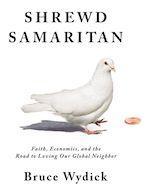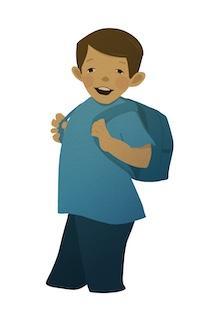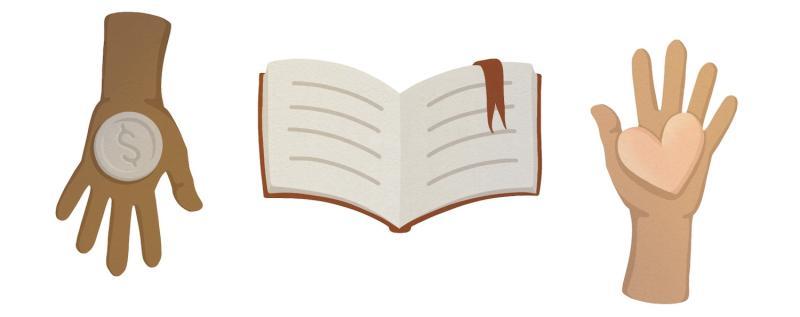Westmont Magazine What Is a Shrewd Samaritan?
by Bruce Wydick, Director of Westmont in San Francisco
Edited Excerpt from “Shrewd Samaritan: Faith, Economics, and the Long Road to Loving our Global Neighbors”
W Publishing, an imprint of Thomas Nelson Publishing. Copyright, 2019
I want to begin this book by telling you a story about my dentist, Dr. David Yee. After learning during my early visits that I was a development economist, he would ask me if I had been to any “crazy new countries” lately. After sharing a few stories about recent travels and research projects, I would ask him if he had done much traveling. “No, afraid I’m a bit of a homebody,” he would say.
One visit I asked him, “Ever thought about doing one of those dental missions?” He replied that yes, he had considered it but hadn’t quite got his courage up. But as he was ushering me into the dental chair before a routine cleaning in 2011, he turned to me and announced proudly, “I went on a dental mission last month.” “That’s great,” I responded enthusiastically. “Where?” “Jamaica.” “How’d it go?”
The dental mission to Jamaica had gone well, just not as anticipated. The missionary dentist asked him, “How many extractions can you do in a day?” Dr. Yee had never pondered this statistic, much less tested its frontiers on his upper-middle-class San Francisco patients. “Maybe eight?” He paused nervously. “How many do I need to do?”
“Yesterday I did 140.”
Dr. Yee considered this spectacular figure. It sounded inhumane. But what he learned in Jamaica was quite the opposite. In a place where infections are rampant and immune systems are weak, infected teeth can be deadly.
The missionary dentist explained that time spent on cosmetic issues, or even maintaining the lofty standards of Western medical care, carries a high opportunity cost in the world of rural missionary dentistry with long lines of patients suffering from abscessed teeth waiting for treatment.
I was impressed with the missionary dentist because she sounded like an economist. She understood the cost of allowing our fuzzy feelings to dictate our actions to people in need rather than a concern for their health and well-being.
A year later, I asked Dr. Yee if he had been to “any more crazy countries” lately. He said he had done a trip to Haiti, one of the most satisfying experiences of his career, both in terms of his impact on patients and the partnership he felt with the other dentists. A few years later the list had grown to El Salvador and the Dominican Republic, along with a return trip to El Salvador.
The dental mission trips had clearly transformed Dr. Yee. From them he had developed a deep compassion for those without access to health care. Moreover, joining his new heart for others was a new head for others. He had begun to learn the art of triage, operating with the skill of a M.A.S.H. medic, prioritizing patients that were likely to receive the greatest benefit from an extraction and treating them as efficiently as possible. He also began to emphasize prevention during his visits. Given the paltry access to dental services, training children to brush and floss their teeth would shorten the waiting lines for extractions on the next visit. It wasn’t all about being Dr. Dental Superman, rescuing people from infected teeth. When possible, it was about loving others by preventing pain and suffering in the first place.
My dentist, Dr. David Yee, was becoming a Shrewd Samaritan.
Given a Chance
Mike Burnett, who served as a Northwest Airlines pilot for 35 years, became involved with international child sponsorship while he was serving as a pilot in the Navy based in the Philippines at Cubi Point. On the Olongapo River, children would float by in rafts, begging for money. Navy men would throw coins to them, and when the coins missed the rafts, the boys would dive for them into the river, a stinking cesspool of human refuse that acted as a sewer for the local area. None of the children were in school, but in Mike’s estimation, pretty much all of them should have been. He felt compelled to do something and began sponsoring a five-year-old Filipino boy named Dino through Christian Children’s Fund, now called ChildFund. Being an airline pilot offered some significant advantages for visiting sponsored children.
Mike remembers the emotions he experienced during his first visit to Dino’s house—a corrugated iron shack located next to a dump, where the family and their neighbors would scavenge for castaway items. It was a level of poverty Mike had never witnessed before. Unlike the other children, Dino’s hair was combed. His face was clean. He was not headed to the dump to scavenge. He wore a new school uniform and a small school backpack that carried a few books, pencils, a pad of paper, and lunch. He looked like a normal school kid. Mike realized that Dino had been given a chance.
He wanted other children to have the same chance, so he decided to sponsor more of them. Over the next thirty-five years, Mike and his wife, Sue, sponsored a long series of children—boys and girls from Guatemala, Ecuador, Brazil, Mexico, Kenya, and other countries. He would use vacation time to fly and visit their sponsored children, listening to their situations, talking with their parents, hearing their dreams, encouraging them to stay in school and to never give up no matter what life threw at them.
Despite the changes he sees in his sponsored children, Mike has always felt the biggest impact from being an international child sponsor has been on him. The majority of Mike’s efforts were not only well-intentioned, but also effective.
I asked Mike what he thought made the biggest impact from the relationships he had with his internationally sponsored children. He told me it depended on the child, and he was keen on understanding the unique needs of each one. Dino, always at risk for dropping out of school and succumbing to the toxic allures of scavenging, constantly needed to be reminded about the importance of staying in school. Mike wrote Dino every few months, and in every letter Mike reiterated that he expected Dino to finish high school. It was something he needed to repeat to Dino again and again, simply because Dino needed to hear it again and again. He was under constant pressure to leave school to contribute to the immediate needs of his family.
During his visits and in his letters, Mike has tried to kindle aspirations for his sponsored children and encourage them to reach high to realize these aspirations. This soft but inspiring voice is one that impoverished children do not hear with the frequency of affluent children. It is a hallmark of some child sponsorship programs that may be responsible for much of their success.
Mike has found that some children already have ideas and dreams for their lives. They just need a helping hand with school fees and other needs for which they lack resources and the knowledge that somebody out there loves them and is rooting for them to succeed. With many of the girls that he sponsored, however, showing that he and his wife cared about their lives helped them amplify their aspirations. For other children, he would simply emphasize how much he and his family cherished them and wanted their good.
One gets the feeling that Mike is someone who studies children and their needs with a focus that others bring to a study of literature or economics or computer chip engineering. He is an example of someone who has taken stock of his abilities and opportunities, and how they have matched with his desire to help others. One by one, Mike has changed the lives of children around the world, and all the best research indicates that the children whose lives he has changed are likely to go on to change their own children’s lives.
Mike Burnett is a Shrewd Samaritan.
A Tale of Two Tales
What is a Shrewd Samaritan? The answer to this question is the purpose of this book. To begin we will consider one of the world’s most renowned short stories, a parable told by Jesus of Nazareth in the first century to address the age-old question of one human being’s responsibility toward another. Christians and non-Christians alike, everybody loves the parable of the good Samaritan (Luke 10:25–37). It has robbers, violence, a good guy, a couple of religious bad guys (always good for juicing up a story), and its message about loving our neighbor is beloved by people of all colors and creeds. A good deal of our ethics in Western society originates from this parable.
But a few chapters later, Jesus tells us another parable—one that is less known, not as popular, and a little strange, the Shrewd Manager (Luke 16:1–9). If there were a popularity contest among all the characters in the parables of Jesus, the Good Samaritan would probably win. In that same popularity contest, the Shrewd Manager would probably finish last. The Shrewd Manager, accused of fraud, seems to do little to redeem his character by giving discounts to his master’s debtors. He appears to be a lazy, deceitful, double-crossing little quisling, not to mention a very bad employee. Yet in this alluringly freakish parable, as with the Good Samaritan, Jesus holds up the Shrewd Manager as some kind of example worth emulating. Why?
This book is about learning to live the message of the Good Samaritan in the context of the globalized world of the 21st century. That said, the Shrewd Manager also has something to contribute to this discussion. The problem with the parable of the Good Samaritan isn’t understanding the parable. It’s living out the lofty standards it defines for loving our neighbor as ourselves. In contrast, the problem with the parable of the Shrewd Manager is understanding what in the world this parable means and what we’re supposed to learn from it. Specifically, what does the Shrewd Manager understand that Jesus thinks his disciples don’t understand?
The Shrewd Manager, despite possible character flaws, understands at least one important thing: money is temporal, but people and relationships are not. Since you are the intermediating steward of any money or resource in your possession, you are to shrewdly mobilize your worldly wealth to serve people. The original Greek word for “worldly wealth” used in the text is mamónas, translated in the old King James as “mammon.” That term refers not just to money but to possessions and one’s resources generally. The word manager in ancient Greek is oikonómon, from where we get the word economics. So in the Greek, the manager is literally the rich patron’s hired “Econo-Man.”
Jesus uses the example of the Shrewd Manager to gently chastise the disciples as “people of the light” who are naïve in their understanding of how to use worldly wealth. In a rhetorical device that Jesus often uses in other parables, he makes a point by illustrating a humorous extreme. It’s as if Jesus is saying: “Check out how the shrewd oikonómon (Econo-Man) manipulates the mamónas (mammon) in his ledger to build an employment network for himself after he is sacked—so shrewdly that his boss even praises him for it. And if he can pull that off, how much more wisely, beautifully, and creatively could you use your mamónas to love and care for the people around you?”
The early disciples were not alone in their naïveté about worldly resources like time, talent, and money. Unfortunately, we still don’t get it today. There are too many kind, 21st-century people with good intentions, whose impact on those living in poverty is hampered by their inability to 1) understand the root of problems; 2) harness the resources available to them to solve the (right) problems; 3) understand the cause-effect relationships related to poverty; and 4) distinguish between “warm-glow” feelings of being a benefactor and creating tangible impacts for an intended beneficiary.
If we want to genuinely help people living in poverty rather than just feel good about believing we have helped, we are not merely to be Good Samaritans. We must be Shrewd Samaritans. We must be people with big hearts but also with minds like the Econo-Man, who are not naïve in their use of worldly resources. This means learning to love our global neighbor wisely, one might say even “shrewdly,” by harnessing the resources at our disposal—our time, talents, opportunities, and money—on behalf of those who are victims of injustice, disease, violence, and poverty. The Samaritan and the Econo-Man together represent a kind of yin-yang tension between heart and mind that is crucial for those who seek to be agents of positive change.
Immeasurable Impact
Bill and Melinda Gates decided early on that the purpose of their marriage would not lie in amassing greater and greater amounts of wealth for themselves and their heirs. They began to devote the same intensity and focus that they had given to software development to investigate solutions to the most critical problems faced by the global poor. They read. They networked in development and philanthropy communities. They attended and spoke at global poverty and development conferences. In 1994 they launched the William H. Gates Foundation, which in 2000 merged with the Gates Learning Foundation to become the Bill & Melinda Gates Foundation.
In an interview with Christianity Today, Melinda Gates discusses the origin of the Gates Foundation: it was during a walk on the beach during a trip to Zanzibar, an island off the eastern coast of Africa. In Zanzibar they had been studying a marriage questionnaire through the Catholic Church to help them discover the purpose of their relationship. It was then they felt a strong prompting to give away their wealth for the benefit of the global poor.
She shares the role that her Catholic faith has played in both creating and shaping the objectives of the foundation: “I went to a Catholic school from kindergarten to 12th grade and attended church with my family every Sunday during that time. The New Testament speaks to me. Jesus was always reaching out to the poor, always trying to get people to not see the poor as different from other people. That was ingrained early for me. . . . For me, faith is about faith in action. With this deep-seated belief, Bill and I believe that all lives have equal value. We try to live that out in what we do as a foundation.”
After creating the foundation, Melinda’s life took on a new mission: how to give away a $40 billion fortune to reduce global poverty and suffering in the most effective way. The decision of Bill and Melinda Gates to transform their immense wealth into a giant global poverty fund attracted followers, and at least one very important one.
In 2006, instead of creating his own foundation for distributing his immense wealth to charitable causes, Warren Buffett pledged to donate 80 percent of his wealth to the Gates Foundation. This decision was strongly influenced by Melinda’s presence in the organization.
The combined assets of the Gates-Buffet fortunes are breathtaking by any standard. It is on pace to disperse perhaps $100 billion to causes related to eradicating global poverty.
But perhaps even more impressive than the mass of wealth held by the foundation is its commitment to effective intervention. Even relative to other well-known foundations, it has painstakingly selected interventions for its funding that offer the greatest impact per dollar on human lives. For this reason, a considerable share of the foundation’s resources is allocated toward global health in areas such as the prevention of preventable illnesses including tuberculosis, pneumonia, HIV, and especially a class of neglected tropical diseases such as river blindness, guinea worm disease, helminth infection, sleeping sickness, and lymphatic filariasis that are widespread in places like South Asia and sub-Saharan Africa.
The Bill & Melinda Gates Foundation has also strongly supported research that tries to uncover the most effective ways to help the poor. The foundation has provided significant funding to institutes such as the Jameel Poverty Action Lab at MIT, Innovations for Poverty Action, and the Center for Effective Global Action at UC Berkeley, at which I am a research affiliate. Funding for these organizations underwrites efforts to study the relative effectiveness of different poverty interventions through the use of randomized controlled trials.
The Bill & Melinda Gates Foundation has already had an immeasurable impact in reducing suffering around the world from poverty and disease through funding poverty interventions that we know to work. Through its funding for research, it will arguably have an even greater impact through more effective interventions in the future. Melinda Gates has played an integral role in shaping the conscience of an immense global transfer of wealth that will continue to affect hundreds of millions of lives around the world.
By every standard, Melinda Gates is a Shrewd Samaritan.
Heart and Head
Shrewd Samaritans love, not only with their hearts, but also with their heads. They are continually learning how to love their neighbor better. They are motivated by feelings of compassion and a yearning for justice, but their actions are guided by careful reflection that is centered on the well-being of the other. They make mistakes in their attempts to care for people, whether in their own communities or far beyond, but they humbly and continually learn from these mistakes.
Shrewd Samaritans understand that their individual calling is not to solve all of the world’s problems. Instead, they understand specific roles in which they are called to thoughtful, committed engagement in domains within their unique sphere of influence. These roles and domains may be intensely personal, including caring for a needy family member, children, parent, or the disabled woman down the street.
Others may feel called outside their family or close community: a marketing manager senses a calling to serve low-income micro-entrepreneurs in sub-Saharan Africa. In responding to this, she extends herself into a domain that is congruent with her expertise and sphere of influence but outside her normal community setting. Another person may choose to financially support organizations that improve education, health, or income-generating capacity for a group of people in a similarly faraway corner of the globe. Others may become engaged with domestic poverty, addressing the needs of kids in inner-city schools, the jobless, and the homeless. Still others may be called to love their neighbor through work at the systemic domain, perhaps at a government policy level.
All of these are valid and important, and those who have found a calling to love their family members and neighbors within their natural community setting are to be lauded.
Yet in this book, my purpose is to develop a road to more effectively loving our global neighbor. Because in an age of globalization, what we can call our neighborhood or our potential sphere of influence has expanded—dramatically. Through the globalization of media, we are aware of needs to which our ancestors could never be cognizant, much less respond to in any meaningful way. Through the combination of the Internet and mobile technology, we are able to transfer resources around the globe while relaxing on a park bench. Increasingly, it will become our global neighbor who takes us out of our comfort zone and challenges us with the needs of a broken world.




